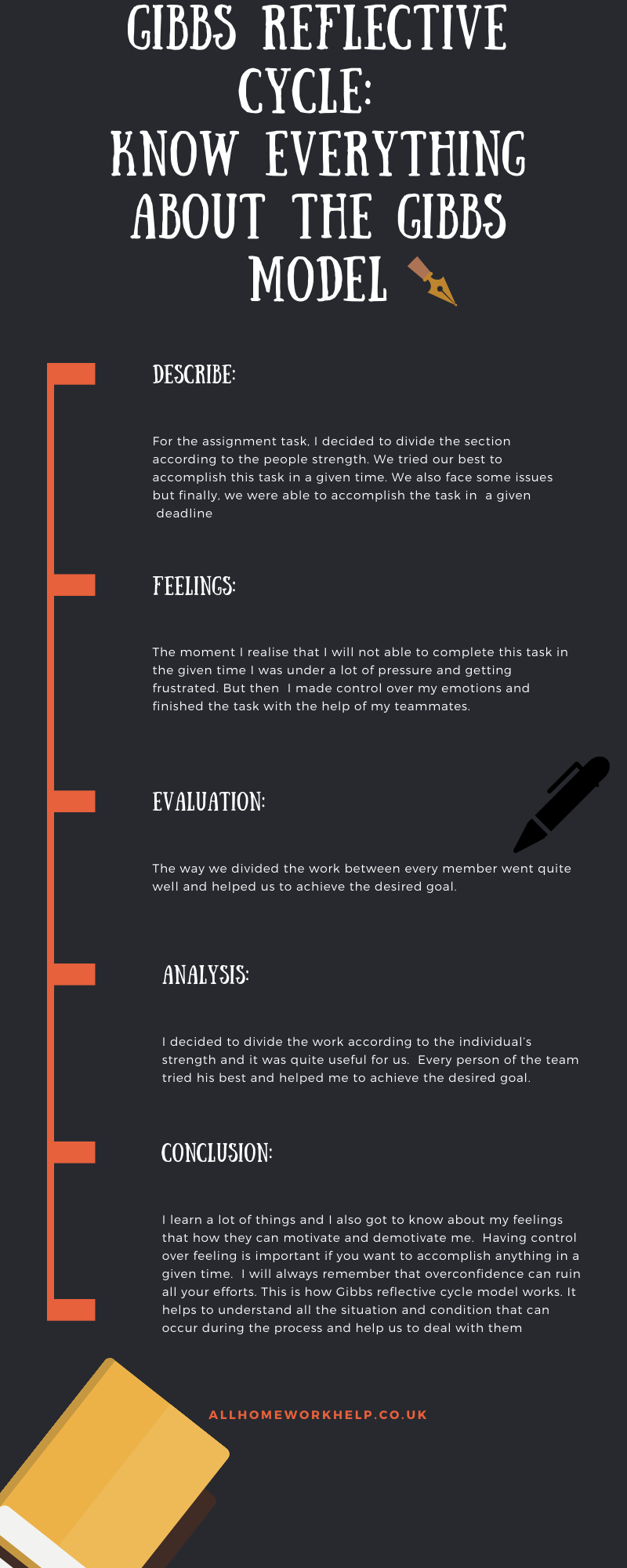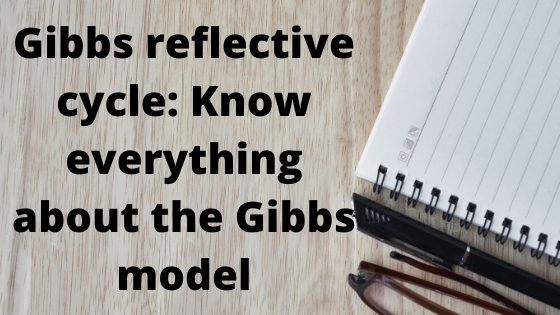Graham Gibbs was a publicly known figure due to his work in the field of sociology and psychology. In 1988 he published his reflective cycle model in his book “learning by doing”. Gibbs reflective cycle model helps people to think constructively and systematically about the experience they had during a particular time period or in a specific situation, event or activity.
With the help of reflection cycle model, we can easily Structure reflection on experiences in various phases. This often makes people think about an activity that they experience and help them to understand their own activities. So that they could better able to adjust their change in behaviour and they can also find out both the negative and positive impact of the event.
With the Gibbs reflective cycle model, you can learn a lot from your actions as it offers a framework by which you can examine your previous experiences.
1. Gibbs Reflective Cycle Model in Brief
It covers 6 stages which are listed below:
- Description of the experience in a detailed manner
- Feelings and views about the experience
- Evaluation of the experience, both positive and negative
- Analysis for understanding the situation
- Conclusion help to know what did you learn?
- An action plan helps to know how would you deal with the same condition
Today in this blog post you will learn everything about Gibbs refection cycle. Thus, as a homework help online provider, we can provide you with the best homework help for your academic task, and fix all your doubts on assignments. So, read on!
A short example of Gibbs’ Reflective Cycle

1.1 Describe
For the assignment task, I decided to divide the section according to the people strength. We tried our best to accomplish this task in a given time. We also face some issues but finally, we were able to accomplish the task in a given deadline.
1.2 Feelings
The moment I realise that I will not able to complete this task in the given time I was under a lot of pressure and getting frustrated. But then I made control over my emotions and finished the task with the help of my teammates.
1.3 Evaluation
The way we divided the work between every member went quite well and helped us to achieve the desired goal.
1.4 Analysis
I decided to divide the work according to the individual’s strength and it was quite useful for us. Every person of the team tried his best and helped me to achieve the desired goal.
Gibbs reflection cycle is one of the major concepts of reflection essay writing. So if you want to increase your knowledge about this topic you can also follow our blog on why reflection paper is an essential part of academics.
With the help of an academic writing service, students can learn various writing techniques. Our get clear about the difference between essay and report writing blog is one of the most searched blogs at our website. You can also follow this blog for learning various writing techniques.
1.5 Conclusion
I learn a lot of things and I also got to know about my feelings that how they can motivate and demotivate me. Having control over feeling is important if you want to accomplish anything in a given time. I will always remember that overconfidence can ruin all your efforts. This is how Gibbs reflective cycle model works. It helps to understand all the situation and condition that can occur during the process and help us to deal with them
2. Gibbs’ reflective cycle model
Gibbs’ reflective cycle model is enough to work through an experience. This experience can be standalone or situational for example, if you want to deal with the customers you have to collaborate with them. It explains that the use of reflective model work with the repeated situation also but the stages and principle will work for the single experience too.
Every stage of the model has various questions that are outlined below you don’t need to answer all of them. But with the help of these questions, you can get guidance about what sort of thing make logic to include in this particular stage.
2.1 Description
In this section, you get a chance to describe the situation in a detailed manner. The main points should be included appropriately. And your feelings and conclusion will take place after the main point of description
2.1.1 Helpful questions for Description
- What did you and the other people do?
- What was the outcome of the situation?
- Why were you there?
- What did you want to happen?
- What happened?
- When and where did it happen?
- Who was present?
2.1.2 Example of Description
You can understand the reflective model with the help of simple example suppose for a writing an assignment I decided to work with a team of three peoples. I decided to divide work in such a manner so that everyone could have his own element for research. I was expecting that we will finish this task before the evening so I decided the deadline for the evening.
I was thinking that it was just a normal piece of paper writing so we started writing without doing research. But our overconfidence spoiled everything as it was not just an ordinary piece of assignment writing. It had several things that are quite complicated. Now we need to rewrite most of the section to make it a coherent piece of work.
We tried our best to complete the assignment before the deadline however we didn’t plan any backup in case if something goes wrong and it was our biggest mistake. So it was completely dependent on us how we proceed the assignment without making any mistake and how would we finish the assignment for the given deadline?
2.2 Feelings
You can experience various kind of feeling and thoughts while dealing with your assignment. And how they may have impacted your experience. Some of the helpful questions that can arise during the experience are listed below:
2.2.1 Helpful questions for Feelings
- How did you control your feelings during the situation?
- What were you feeling before and after the situation?
- How other people will react to the same situation?
- What were your thoughts during the situation?
- Your current opinions for the situation
2.2.2 Example of Feelings
I had a team of 3 members. And I had successfully divided the work between every member of my team. I was quite happy and expecting that we will easily complete this task in a given deadline. But w I realised that the assignment was quite different from our previous task. And I got frustrated, I thought that we will never be able to deliver the assignment before the deadline.
This made me quite angry and I was full of guilty but this feeling helped me to work harder and my team-mates motivated me to complete my assignment in a given time. I again divided every section and did some research with my teammates surprisingly we made it and completed our task before the deadline.
It was my feelings that made me quite angry but also it was my feeling that motivated me to complete my task in a given time when my teammates encouraged me.
2.3 Evaluation
Now you need to evaluate the work and how did you react in a particular situation. Try to find out the answers of questions given below and get the answers focused on both of the parameter either positive or negative.
2.3.1 Helpful questions of Evaluation
- What was your expectation from the experience?
- Things that happened according to your expectations?
- What didn’t go so well?
- What did you and other people contribute to the situation (positively or negatively)?
2.3.2 Example of Evaluation
The good thing about writing task was the fact which made us believe that every member gave his 100 per cent. They were ready to accomplish this task in a given deadline but when we realise that the assignment task is not an ordinary piece of writing.
Then we realised that we need to do a lot of work and research. With full motivation, we started the work again and we completed our task with full of positivity. This shows the dedication of our teammates and I realised that if we work with full dedication the chances of success would be high.
2.4 Analysis
In this section, you get a chance to understand what makes sense of what happened? And when you get the answer of all your queries you work with more focus and try to cope up with the situation. And then you can easily extract the exact meaning from it.
Some of the helpful questions of this section are listed below:
2.4.1 Helpful questions for Analysis
- Things that go well?
- Things that didn’t go well?
- What sense can I make of the situation?
2.4.2 Example of Analysis
I think the idea of making a team and dividing the work to every person of the team was a good decision and it helped us to achieve our goal. But due to overconfidence about the work, we thought that we will easily complete this task without making any extra efforts. And that was our biggest mistake. I experienced that how I was unable to deal with my anger.
I was getting frustrated after seeing no progress in the writing task. So I decided to analyse the whole process and when got the exact issue I decided to work on it with my team. And finally, we made it. We fixed all the issues and accomplished the task. That’s why we should always remember that when a complicated situation arises we should not lose our calm. And try to find the exact issue and fix it as soon as possible for the desired result.
2.5 Conclusions
It is a section where we windup the whole discussion about the whole process like what happened and what was the result? You also figure out all the changes in your behaviour during the process and what did you experience in the conclusion. You also share your reaction that how will you improve it for future situations.
2.5.1 Helpful questions for Conclusion
- What things can I learn from this situation?
- How could this have been a more positive situation for everyone involved?
- What kind of skills do I need to develop if I want to handle a situation like this better?
- What else could I have done?
Was it helpful?
I hope this article on Gibbs Reflective Cycle Model helped you. If you have any suggestions or feedback regarding the blog, you can write in the comment section below. Our academic writing website is meant for minimising students academic stress of writing. We at our website provide accounting homework help, mathematics homework help and many more.
Thank you for reading!
